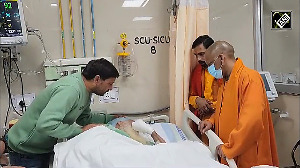Wearing a plain brown sari and a gemless gold ring, Vandana sits patiently in the swank, white-and-green lounge of a private hospital in Delhi. Her only other piece of jewellery is a gold bangle worn over four red glass bangles.
A black knapsack rests at her feet. "My husband has a kidney problem," she says slowly. "He is being treated at AIIMS (All India Institute of Medical Sciences) but the doctors there asked us to get his dialysis done at a private hospital."
Vandana and her husband have travelled 116 km from Muzaffarnagar and are happy with the service and attention they are receiving at the private hospital - Max Balaji, recommended to them by AIIMS and a family member who was operated on there.
Vandana and her husband are part of a movement the private healthcare sector is witnessing in India. Though the trend started with Apollo Hospitals in Chennai many years ago, it is picking up at mindboggling speed.
Healthcare is the new buzzword for corporates and individual businessmen alike, with many corporates setting up private hospitals under their banner. Private healthcare has grown into a formidable industry with an estimated worth of Rs 80,000 crore (CII estimate).
The result: hospitals that don't resemble hospitals, machines that were once unheard of in India and services that can match any five-star hotel. Yes, the Indian healthcare industry is getting an extreme makeover and is touching the lives of people not just in India but all over the world.
According to a CII study, with demand exceeding supply, the industry is expected to continue its upward run at a rate of 13 per cent annually for the next six years.
The last five years have witnessed the evolution of very large corporate hospitals that don't stop at just a single unit. So you have Max Healthcare setting up six hospitals in Delhi alone, Wockhardt setting up 10 across the country, Apollo Hospitals going international and Fortis Healthcare running 12 hospitals in north India, with more in the pipeline. Indian healthcare owes its facelift to changing consumer expectations.
Vishal Bali, CEO, Wockhardt says, "Indian consumers are being exposed to global healthcare standards and expect similar services here." Consider this: today, a middle-level manager with a family of four spends between Rs 8,000-12,000 a year on healthcare, compared to Rs 2,000 in the late 1980s.
Corporate hospitals have not only raised the bar for healthcare in India but have also eased the pressure off government hospitals dealing with tertiary care. Waiting time for patients has dipped since those requiring immediate attention are promptly referred to a private hospital.
Praveen Chawla, COO, Fortis Hospital says, "The private sector is able to provide a much higher quality of healthcare." Visit any corporate hospital today and the first thing you notice is the presence of people from low- to high-income groups under one roof, demanding and receiving the same services.
As Dr Naresh Trehan, MD, Escorts Heart Institute and Research Centre says, "Healthcare is a business with a soul. So it is very important that corporates run it in a humane manner, laying their foundation on ethics and ethos associated with the healthcare industry."
Famously referred to as five-star hospitals, private hospitals are now attempting to break away from this image and are reaching out to people from all walks of life through health insurance cover, competitive rates and even free treatment for some.
Mukesh Shivdasani, executive director, Max Healthcare and chief executive, NCR 1 explains, "Private hospitals are not as expensive as is perceived. Also, there are organisations that help the economically challenged in meeting hospital expenses."
The growing demand for private healthcare and the awareness towards the sector has also encouraged insurance companies to push their health insurance policies, covering everything from doctor's fees, room charges, diagnostic charges and medicine to pre- and post-hospitalisation expenditure.
Kartik Jain, marketing head for ICICI Lombard, believes that with the cost of healthcare going up and lifestyle diseases also witnessing a rise, there is a sudden need and demand for health insurance. Today, even corporates are sustaining employees by including health insurance as a benefit.
However, the number of people picking up a health insurance policy is insufficient. Health cover premiums account for less than one per cent of life insurance premiums. In fact, the health cover premium collections for 2004-05 were around Rs 1,800 crore (Rs 18 billion).
One of the biggest benefits of corporatisation is the building of brand India as a medical tourism destination or, as Shivdasani puts it, a global healthcare destination. SAARC countries like Bangladesh, Afghanistan, Sri Lanka, Malaysia and Indonesia account for the most patients, with the US and UK following suit.
While patients from SAARC countries come in search of better healthcare options at competitive rates, for the US and UK it is primarily a matter of getting world-class healthcare at less than half the cost. However, the one factor that is pulling people into India is the quality of service in the healthcare industry.
"Hospitals are bending over backwards to make sure international patients feel comfortable," says Chawla, "with services like airport pick-up and drop, a city tour, critical care and constant communication with the patient's hotel."
Take 56-year-old California resident Billy Schroeder, who was denied health insurance in the US due to high prostate-specific antigen and suspected cancer. The tests that confirmed he had prostate cancer cost him $7,000. Schroeder decided to head East for his treatment and came to Fortis Hospital, Delhi.
His complete surgery here cost him $10,000. "I think hospitals here are as good as, if not better than, any hospital in the US. The heartening thing is that the staff spends time with you and makes sure you are comfortable and satisfied." A month after coming to India, Schroeder is now ready to head home...cured.
Beyond curing patients, corporate hospitals are transforming the lives of another set of people - doctors. The worth of doctors is now being realised not by the corporates alone but even by the doctors themselves.
Dr. Upendra Kaul, director and HoD, cardiology at Fortis Hospital, recalls, "I used to work at a government hospital and the experience was very different. In a private corporate set-up like this you don't face bureaucratic hassles."
The corporate set-ups have also given doctors access to resources like never before. Dr Ajaya Nand Jha, director of neuro-surgery at Max Super Speciality Hospital, has two high-end computers and one laptop in his office.
"I need these to keep records, track patients, communicate with other doctors and to keep myself updated with the latest happenings in the medical world," he says. "In this competitive world, you need to keep running to stay in the same spot."
The biggest benefit though has been in terms of salary and lifestyle change. Dr Arvind Taneja, director-paedriatrics at Max Hospital, admits being involved with a lot of administrative work at Max.
"I have been a consultant at many private and government hospitals but this has by far been my most advanced centre to date. We are working with technology that is enabling us to provide much more than just basic healthcare."
An interesting trend among corporate hospitals is that of setting up super-speciality or multi-speciality hospitals vis-à-vis general hospitals. Speciality centres bring one medical department together under one roof.
So, you have a super speciality hospital focusing on neuroscience, orthopedics, obstetrics and gynecology, cardiac care and oncology. Speciality hospitals come into play once your illness has been diagnosed.
Thus, if you suffer from a neurological problem, instead of visiting a general hospital where you might be shunted from one department to another, you would ideally visit a hospital that specialises in neurological sciences and has all the necessary equipment and expertise in the field. Today these hospitals are also constantly investing large sums of money in the latest technology and machinery.
But like every other positive trend, the corporatisation of hospitals has its pitfalls. A major concern among doctors and patients alike is the filtration of expertise as you go down the ladder in doctor rankings.
Hospitals are selling their treatment services by hiring the best names from the medical field. But healthcare is not a one-man show. Whether the expertise is trickling down to the doctor's juniors remains to be seen. The movement is still in its nascent stage and sustenance of service and standards over the next few years will be the decisive test.
Healthcare experts also feel the need for medical standardisation, accreditation and certification in the medical sector by the government, to maintain standards.
"We need standardisation to come into play in the country," says Dr Dharminder Nagar, CEO, Paras Hospital. Agrees Trehan, "We are providing a service and must do so with decency and sensitivity towards the community. India needs more regulation in healthcare."
Vishal Bali believes India needs to create drivers of affordability of healthcare for the average Indian. That, however, has not received sufficient attention in a rapidly growing economy.
In fact, the general belief is that private consultants are encouraged to ask for superfluous tests and even avoidable procedures so that the hospitals can recover the cost of the investments made in testing and other equipment.
Still, the availability of an alternative to government hospitals, and of quality care at reasonable cost, is changing the lives of tens of thousands. Vandana and her husband agree. "If you want good health, you have to pay for it, no matter what," she says, as she steps into the hospital garden with her husband to sit in the sun.
The Way To Healing
Statistics
-
The Indian healthcare industry is now estimated to be a $17 billion (Rs 80,000 crore) industry.
-
The total spend on the healthcare sector currently accounts for 6.1 per cent of the GDP, of which the government spend is 1.1 per cent.
-
The annual growth rate of the industry is 13 per cent and is expected to continue at this rate for the next six years.
-
Most healthcare users pay from their own pocket and prefer to use private services as compared to government services.
-
India has only 43 doctors for every 10,000 people as compared to the 2,340 doctors per 10,000 people in the US.
-
Hospitals in India run at an occupancy rate of 80-90 per cent.
-
Major corporations like the Tatas, Apollo Group, Fortis, Max, Wockhardt, Piramal, Duncan, Ispat and Escorts have made significant investments in setting up state-of -the-art private hospitals in cities like Mumbai, New Delhi, Chennai and Hyderabad.
-
India receives 1.5 lakh medical tourists every year. A CII-McKinsey report has projected that medical tourism could contribute Rs 5,000-10,000 crore (Rs 50-100 billion) as additional revenue for the tertiary care hospitals by 2012. This will account for 3-5 per cent of the total healthcare delivery market
Medical technology and services
Apollo Hospitals
-
Introduced the revolutionary 64-Slice CT scanner that allows a full body scan in seven seconds.
-
Invested in the 3 Tesla MRI scanner that can show real time changes in body tissue and disease progression.
-
Pioneered in setting up the first modern secondary care, rural hospital, using telemedicine.
-
Has partnered with various organisations like ISRO, CDAC and the Government of Japan to increase the outreach of telemedicine.
-
Has entered into an agreement with John Hopkins Medicine International for collaboration in numerous clinical departments.
-
Entered into an agreement with Reliance Infocomm where Reliance WebWorlds will offer access to the Apollo Telemedicine Networking Foundation
-
Set up new super speciality centres - Apollo Centre for Obesity Diabetes and Endocrinal Diseases, Apollo Pediatric Cardiology and Cardiac Surgery Unit and Apollo Centre for Advanced Pediatrics
-
Plans underway to set up hospitals in Mauritius, Fiji, Ethiopia and Abu Dhabi.
Max Hospitals
-
Owns and operates six hospitals in Delhi and NCR. Plans to operate a total of nine hospitals in this region with an investment of Rs 700 crore (Rs 7 billion).
-
Launched the Six Sigma Methodology for improving administrative processes to improve quality.
-
Acquired the Brain Suite, an intra operative MRI system. This is the first such installation in the Asia Pacific, and the third in the world.
-
Runs the Max TeleMed service, with special focus on Manipur, and plans to extend services to rural areas in the country.
Fortis Hospitals
-
Runs 11 hospitals across north India. Planning two more hospitals in the NCR with a total investment of Rs 550 crore (Rs 5.5 billion).
- Acquired the Escorts Group last year and holds 90 per cent interest in it.
- Planning a medical college in Gurgaon called Fortis Institute of Medical and Bio Sciences.
-
The Escorts Heart Institute and Research Centre has a tie-up with Air Deccan for its air ambulance service called Air Rescue One.
-
Has an ongoing telemedicine network across north India.
Wockhardt Hospitals
-
Are South Asia's first Journal of Clinical Investigation accredited super speciality hospitals.
-
Have associations with Harvard Medical International, which gives them access to the best hospitals in the US for knowledge and research. Leader in medical tourism in India
More To Come
-
Escorts' Dr Naresh Trehan's Rs 1,200 crore (Rs 12 billion) project, Medicity, a centre for integrated medical sciences and holistic therapies in Gurgaon
-
Apollo Tyres' Artemis Hospital in Gurgaon
-
Reliance Anil Dhirubhai Ambani Group's multi-speciality hospital in Mumbai
Voices
"The private sector has been actively involved in healthcare. What we are witnessing now is corporatisation" - Harpal Singh, chairman, Fortis Healthcare
"The access to high-end technology has become easier now and hospitals cannot afford to ignore this technology" - Vishal Bali, CEO, Wockhardt Hospitals
"Corporates should bring with them the highest degree of accountability. Privatisation of healthcare delivery by the right corporates is good for the country and the patients" Analjit Singh, chairman, Max India







 © 2025
© 2025